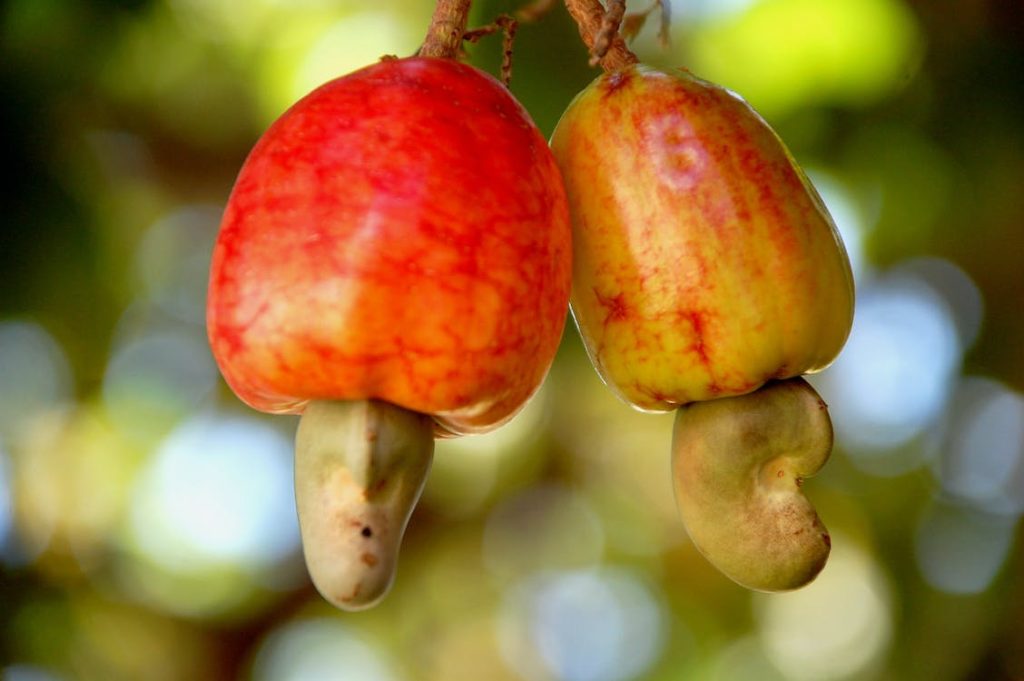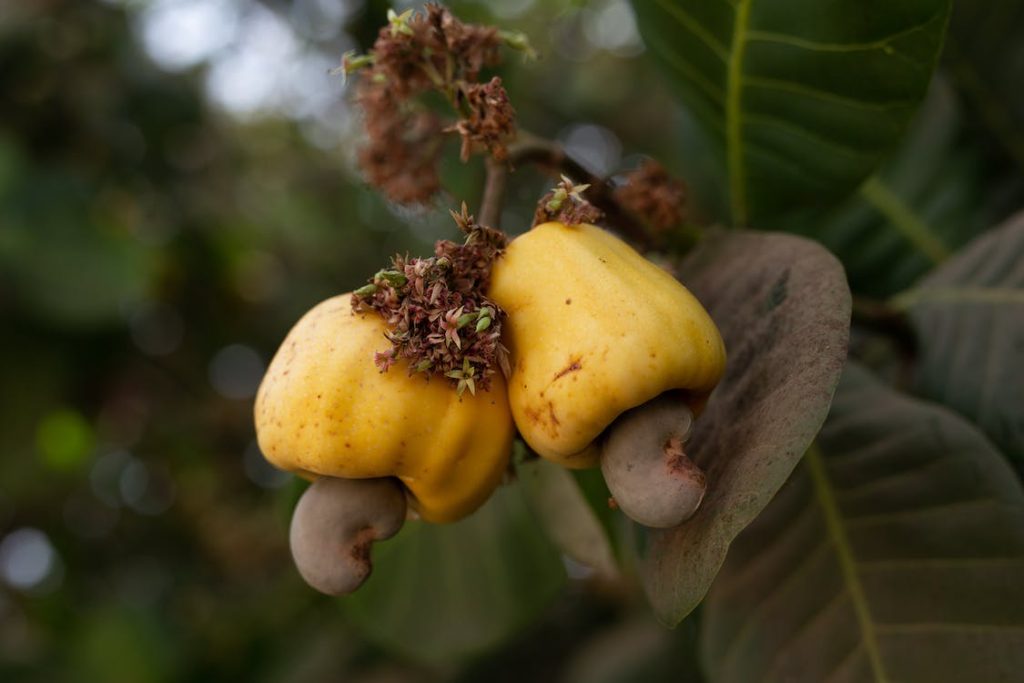In the world of nuts, one delectable gem stands out with its unique shape, creamy texture, and delightful taste – the cashew nut. Revered for its versatility, the cashew nut has found its way into our culinary adventures, snack cravings, and even wellness regimens. But there’s much more to these bite-sized wonders than meets the eye. In this comprehensive exploration, we’ll look into the fascinating origins of cashew nuts, uncover their rich nutrient profile, highlight their benefits, and address common queries, all while savoring the crunchy and creamy world of cashews.
Where do cashew nuts come from?
Cashew nuts, scientifically known as Anacardium occidentale, originate from the cashew fruit, which thrives in tropical regions with warm climates. This intriguing fruit is native to Brazil, but it has since been embraced by various countries, leading to its cultivation in regions spanning from Asia to Africa.
The cashew fruit presents a curious peculiarity – it bears both the nut and the cashew apple, a juicy, pear-shaped fruit that boasts a tangy and refreshing taste. While the cashew apple is cherished in some cultures, it’s the nut that has truly captured worldwide attention.

Nutrients and Calories in Cashew Nuts
The nutritional composition of cashew nuts reveals a treasure trove of essential nutrients that contribute to their wholesome appeal. A typical 1-ounce (28-gram) serving of cashew nuts contains approximately 157 calories, making it a satisfying yet calorie-conscious snack option. These nuts are brimming with heart-healthy monounsaturated fats, which have been associated with reduced risk factors for cardiovascular diseases.
Cashew nuts also serve as a noteworthy source of dietary minerals. In each serving, you’ll find a generous dose of magnesium, phosphorus, zinc, and manganese, all of which play pivotal roles in maintaining bone health, supporting immune function, and aiding energy metabolism. Additionally, cashews offer a protein punch, making them a valuable addition to vegetarian and vegan diets.
20 Cashew Nut Benefits
1. Nutrient-Packed Energy Reservoir
Cashew nuts emerge as a compact powerhouse of nutrients that provide sustained energy throughout the day. Their combination of healthy fats, protein, and dietary fiber makes them a satiating snack, curbing hunger pangs and preventing overindulgence.
2. Heart Health Guardian
Rich in monounsaturated fats and low in unhealthy saturated fats, cashews contribute positively to heart health. Regular consumption has been linked to reduced levels of bad cholesterol (LDL cholesterol) and a decreased risk of cardiovascular diseases.
3. Glowing Skin Ally
The presence of antioxidants, such as vitamin E, in cashews fosters skin health by combating oxidative stress and promoting collagen production. These properties contribute to a youthful and radiant complexion.
4. Weight Management
Contrary to the perception that nuts can lead to weight gain, moderate consumption of cashew nuts has been associated with weight management due to their satiating effect, which can prevent excessive calorie intake.
5. Mineral Bank for Bone Health
Cashew nuts present a rich supply of essential minerals like magnesium, phosphorus, and calcium, all of which contribute to maintaining robust bone health and staving off conditions like osteoporosis.
6. Blood Health Partner
The high copper content in cashews supports the body’s ability to produce and utilize iron, aiding in the prevention of anemia. Adequate copper levels also facilitate overall immune function.
7. Cognitive Supporter
Cashews boast an impressive dose of thiamine, a B-vitamin that supports cognitive function and helps prevent cognitive decline, making them a smart choice for brain health.
8. Diabetes-Friendly Nut
Despite their slightly sweet flavor, cashew nuts have a relatively low glycemic index. This means they have a minimal impact on blood sugar levels, making them a suitable option for individuals with diabetes.
9. Source of Essential Amino Acids
Cashew nuts are packed with essential amino acids, which are the building blocks of proteins. Incorporating them into your diet supports muscle repair, immune function, and overall body maintenance.
10. Antioxidant Arsenal
Loaded with antioxidants like selenium, cashew nuts contribute to cellular health by protecting cells from oxidative damage and reducing the risk of chronic diseases.
11. Vision Protector
The presence of zeaxanthin, an antioxidant found in cashews, has been linked to promoting eye health by filtering harmful high-energy light and aiding in preventing age-related macular degeneration.
12. Hair Vitality Booster
Cashews contain biotin, a B-vitamin essential for maintaining healthy hair and nails. Regular consumption can contribute to lustrous locks and strong nails.
13. Stress Buster
Magnesium, a mineral prevalent in cashew nuts, is known for its stress-relieving properties. It helps relax muscles and promotes a sense of calm and well-being.
14. Digestive Friend
The dietary fiber content in cashews supports healthy digestion by preventing constipation and promoting the growth of beneficial gut bacteria.
15. Energy Metabolism Facilitator
The metabolism-boosting properties of cashew nuts can be attributed to their abundance of B-vitamins, particularly riboflavin and thiamine, which aid in converting food into energy.
16. Essential Fatty Acids Supplier
Cashew nuts provide a dose of essential fatty acids like omega-3 and omega-6, which are crucial for brain health, heart health, and overall cellular function.
17. Anti-Inflammatory Agent
Cashew nuts contain compounds with anti-inflammatory properties, which can help reduce the risk of chronic inflammatory conditions.
18. Immune System Fortifier
The diverse array of vitamins and minerals in cashews, including zinc and vitamin C, supports immune function, helping the body ward off infections.
19. Blood Clot Regulator
Vitamin K, present in cashew nuts, contributes to blood clotting regulation, ensuring wounds heal properly and preventing excessive bleeding.
20. Anti-Cancer Potential
Some compounds found in cashew nuts, such as proanthocyanidins and copper, have been linked to potential anti-cancer effects by inhibiting the growth of cancer cells.

Cashew Nut Benefits for the Female Breast
Among the myriad benefits of cashew nuts, an intriguing connection emerges between their consumption and breast health. Cashew nuts contain compounds like plant sterols, flavonoids, and antioxidants that may have a positive impact on breast tissue health. While further research is needed to establish conclusive evidence, preliminary studies suggest that these compounds could play a role in reducing the risk of breast cancer and supporting overall breast health. It’s important to note that cashews, while potentially beneficial, should not replace medical advice or regular screenings for breast health.
Why are cashew nuts expensive?
The allure of cashew nuts is often accompanied by a question: why are they so expensive? The answer lies in their intricate harvesting and processing methods. Unlike most other nuts, cashews are not as straightforward to extract. The cashew nut is encased in a hard shell attached to a toxic oil-containing layer, known as the cashew shell oil.
This oil can cause skin irritation and must be carefully removed during processing. The labor-intensive and meticulous process of shelling, roasting, and extracting cashew nuts contributes to their higher production costs, thus making them relatively pricier compared to other nuts.
Read also: A complete guide to cassava farmingAre Cashew Nuts Fattening?
The notion that nuts are inherently fattening is a misconception that’s been debunked by nutritional research. While it’s true that nuts are energy-dense due to their fat content, including cashew nuts in moderation can actually aid in weight management. The healthy fats found in cashews provide a feeling of fullness, reducing the likelihood of overeating. Moreover, the combination of healthy fats, protein, and fiber in cashew nuts can contribute to a balanced and satiating diet, making them a valuable asset for those seeking to maintain or lose weight.
Are Cashew Nuts Poisonous?
The notion that cashew nuts are poisonous is partially rooted in truth. The cashew nut’s shell contains a toxic oil known as urushiol, the same compound found in poison ivy. This toxic substance can cause skin irritation and even blistering upon contact. However, the cashews available for consumption undergo thorough processing to remove the shell and the toxic oil, rendering them safe and delicious to eat. So, rest assured, the cashew nuts you find in stores are perfectly safe to enjoy without any worry of poisoning.
Fun Facts About Cashew Nuts
- Cashews belong to the same botanical family as poison ivy and poison sumac, which is why their shell contains urushiol.
- The cashew apple, often discarded, can be used to make jams, jellies, beverages, and even liqueurs in some cultures.
- Cashews were introduced to India by Portuguese explorers in the 16th century, and today, India is one of the largest cashew producers.
- Unlike most nuts, cashew nuts grow outside the fruit rather than inside. The cashew nut dangles at the end of the cashew apple, defying the typical pattern of nuts growing within the fruit’s core.
- Cashew shells are used in some industries to produce lubricants, paints, and even insecticides.
- While often referred to as nuts, botanically speaking, cashew nuts are actually seeds. More specifically, they’re considered “drupe seeds,” as they’re found within the pit of the cashew apple.
- Before processing, cashew nuts are actually green due to the presence of the cashew shell oil. It’s only after meticulous processing that they take on their familiar creamy hue.
Read also: A complete guide to maize farmingThe bottom line
Cashew nuts, with their rich history, nutritional potency, and array of benefits, prove to be a versatile and delightful addition to our culinary experiences and health pursuits. From their beginnings in tropical lands to their journey into international cuisine, these creamy and crunchy marvels have captured hearts and palates around the world.
The next time you enjoy a handful, savor not just their taste, but the wealth of nutrients and wonders they bring to the table. Remember, nature’s treasures often come in small packages, and this nut is a testament to that adage. So, indulge, savor, and relish the wholesome delight that is the cashew nut.
